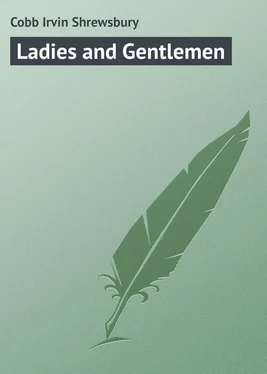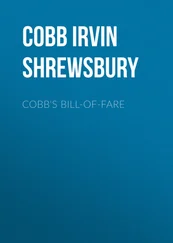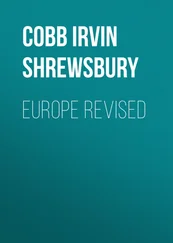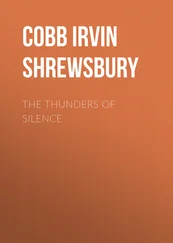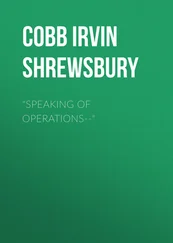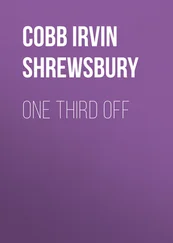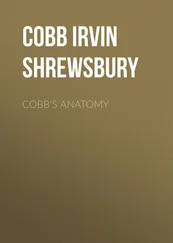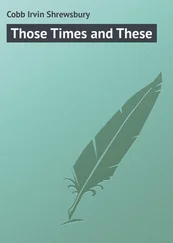Irvin Cobb - Ladies and Gentlemen
Здесь есть возможность читать онлайн «Irvin Cobb - Ladies and Gentlemen» — ознакомительный отрывок электронной книги совершенно бесплатно, а после прочтения отрывка купить полную версию. В некоторых случаях можно слушать аудио, скачать через торрент в формате fb2 и присутствует краткое содержание. Жанр: foreign_prose, на английском языке. Описание произведения, (предисловие) а так же отзывы посетителей доступны на портале библиотеки ЛибКат.
- Название:Ladies and Gentlemen
- Автор:
- Жанр:
- Год:неизвестен
- ISBN:нет данных
- Рейтинг книги:4 / 5. Голосов: 1
-
Избранное:Добавить в избранное
- Отзывы:
-
Ваша оценка:
- 80
- 1
- 2
- 3
- 4
- 5
Ladies and Gentlemen: краткое содержание, описание и аннотация
Предлагаем к чтению аннотацию, описание, краткое содержание или предисловие (зависит от того, что написал сам автор книги «Ladies and Gentlemen»). Если вы не нашли необходимую информацию о книге — напишите в комментариях, мы постараемся отыскать её.
Ladies and Gentlemen — читать онлайн ознакомительный отрывок
Ниже представлен текст книги, разбитый по страницам. Система сохранения места последней прочитанной страницы, позволяет с удобством читать онлайн бесплатно книгу «Ladies and Gentlemen», без необходимости каждый раз заново искать на чём Вы остановились. Поставьте закладку, и сможете в любой момент перейти на страницу, на которой закончили чтение.
Интервал:
Закладка:
Dinner was at seven-thirty, with twelve at the table and place cards, and Delia impressed to aid Ditto at serving, and the finest show of flowers that Mrs. Gridley’s dusty and famished garden could yield. She had spent two hours that afternoon picking the least wilted of the blossoms and designing the decorative effects. Little things occurred, one or two of them occurring before the dinner got under way.
Ditto approached the lady of the house. “Madame,” he said throatily, in the style of one who regally bears yet more regal tidings, “madame, Mr. Boyce-Upchurch doesn’t care for cocktails. ’E would prefer a sherry and bittez.”
“Oh!” exclaimed Mrs. Gridley in a small panic of dismay. “Oh, I’m so sorry but I’m afraid there isn’t any sherry.”
“There’s cooking sherry out in the kitchen, sis,” said Mr. Braid, who stood alongside her smiling happily about nothing apparently. “Tackled it myself the other day when I was feeling daredevilish.”
“But the bitters – whatever they are!”
“Give him some of that cooking sherry of yours and he’ll never miss the bitters.”
“Sh-h-h,” she warned, “he might hear you.”
He didn’t, though. At that moment Mr. Boyce-Upchurch was in conversation with Mrs. Thwaites and her husband from two doors away. He was speaking to them of the hors d’œuvres which had just been passed, following the cocktails. The Thwaites were fellow countrymen of his; their accent had betrayed them. Perhaps he felt since they spoke his language that he could be perfectly frank with them. Frankness appeared to be one of his outstanding virtues.
It now developed that the relish attracted him and at the same time repelled. Undeniably, Norah’s fancy ran to the concoction of dishes, notably, appetizers and salads, which one read about in certain standard women’s magazines. Her initial offering this night had novelty about it, with a touch of mystery. Its general aspect suggested that Norah had drowned a number of inoffensive anchovies in thick mayonnaise and then, repenting of the crime, had vainly endeavored to resuscitate her victims with grated cheese.
“Messy-looking, eh?” Mr. Boyce-Upchurch was pointing an accusing finger at the coiled remains on a bit of toast which Mrs. Thwaites had accepted, and he was speaking in a fairly clear voice audible to any who might be near at hand. “Glad I didn’t take one. Curious fancy, eh what, having the savory before dinner instead of afterwards – that is, if the ghastly thing is meant to be a savory?”
Major Thwaites mumbled briefly in a military way. It might have been an affirmative mumble or almost any other variety of mumble; you could take your choice. Mrs. Thwaites, biting at her lower lip, went over and peered out of a front window. She had an unusually high color, due perhaps to the heat.
That, substantially, was all that happened in the preliminary stages of the dinner party. There was one more trifling incident which perhaps is worthy to be recorded but this did not occur until the second course was brought on. The second course was terrapin. Mrs. Gridley was a Marylander and she had been at pains to order real diamond-backs from down on the Eastern Shore and personally to make the stew according to an old recipe in her family. Besides, the middle of July was not the regular season for terrapin and it had required some generalship to insure prime specimens, and so naturally Mrs. Gridley was proud when the terrapin came on, with the last of her hoarded and now vanishing store of Madeira accompanying it in tiny glasses.
Mr. Boyce-Upchurch sniffed at the fragrance arising from the dish which had been put before him. He sniffed rather with the air of a reluctant patient going under the ether, and with his spoon he stirred up from the bottom fragments of the rubbery black meat and bits of the queer-shaped little bones and then he inquired what this might be. He emphasized the ‘ this .’
“It’s terrapin,” explained Mrs. Gridley, who had been fluttering through a small pause for him to taste the mixture and give his verdict. “One of the special dishes of my own state.”
“And what’s terrapin?” he pressed. She told him.
“Oh,” he said, “sort of turtle, eh? I shan’t touch it. Take it away, please,” – this to the reverential Ditto hovering in the immediate background.
From this point on, the talk ceased to be general. In spots, the dinner comparatively was silent, then again in other spots conversation abounded. From his seat near the foot, Mr. Braid kept casting interpolations in the direction of the farther end of the table. Repeatedly his sister squelched him. At least, she tried to do so. He seemed to thrive on polite rebuffs, though. He sat between the Thwaites, and Major Thwaites was almost inarticulate, as was usual with him, and Mrs. Thwaites said very little, which was not quite so usual a thing with her, and Mr. Braid apparently felt that he must sow his ill-timed whimsicalities broad-cast rather than bestow them upon the dead eddy of his immediate neighborhood.
For instance, when Miss Rachel Semmes, who was one of Ingleglade’s most literary women, bent forward from her favored position almost directly opposite the guest of honor and said, facing eagerly toward him over the table, “Oh, Mr. Boyce-Upchurch, talk to me of English letters,” Mr. Braid broke right in:
“Let’s all talk about English letters,” he suggested. “My favorite one is ‘Z.’ Well, I like ‘H,’ too, fairly well. But to me, after all, ‘Z’ is the most intriguing. What’s your favorite, everybody?”
Here, as later, his attempted levity met deservedly the interposed barrier of Miss Semmes’ ignoring shoulders. She twisted in her place, turning her back on him, the more forcibly to administer the reproof and with her eyes agleam behind her glasses and her lips making little attentive sucked-in gasping sounds, she harkened while Mr. Boyce-Upchurch discoursed to her of English letters with frequent references to his own contributions in that great field.
As the traveled observer in his own time may have noted, there is a type of cultured Britisher who regards it as stupid to appear smart in strange company, and yet another type who regards it as smart to appear stupid. Mr. Boyce-Upchurch fell into neither grouping. He spoke with a fluency, with an authoritative definiteness, with a finality, which checked all counter-thoughts at their sources. In his criticisms of this one and that one, he was severe or he was commendatory, as the merits of the individual case required. He did not give opinions so much as he rendered judgments. There was about him a convincing firmness. There was never even a trace, a suggestion of doubt. There were passages delivered with such eloquence that almost it seemed to some present as though Mr. Boyce-Upchurch must be quoting from a familiar manuscript. As, if the truth must be known, he was. Still, had not all of intellectual America as far west as Omaha acclaimed “Masters of the Modern English Novel, with Selected Readings from the Author’s Own Books” as a noteworthy platform achievement?
Thus the evening passed, and the Gridleys’ dinner party. All had adjourned back again to the living-room, where coffee and cigarettes were being handed about, when from without came gusts of a warm swift wind blowing the curtains and bringing a breath of moistness.
“Oh, I believe it’s really fixing to rain,” declared Mrs. Gridley, hopefully, and on this, as if in confirmation, they all heard a grumble of distant summer thunder off to the northwest.
At that, Mrs. Thwaites said she and the Major really must run home – they’d come away leaving all the windows open. So they bade everybody good night – the first ones to go.
Mr. Braid saw them to the door. In fact he saw them as far as the front porch.
Читать дальшеИнтервал:
Закладка:
Похожие книги на «Ladies and Gentlemen»
Представляем Вашему вниманию похожие книги на «Ladies and Gentlemen» списком для выбора. Мы отобрали схожую по названию и смыслу литературу в надежде предоставить читателям больше вариантов отыскать новые, интересные, ещё непрочитанные произведения.
Обсуждение, отзывы о книге «Ladies and Gentlemen» и просто собственные мнения читателей. Оставьте ваши комментарии, напишите, что Вы думаете о произведении, его смысле или главных героях. Укажите что конкретно понравилось, а что нет, и почему Вы так считаете.
